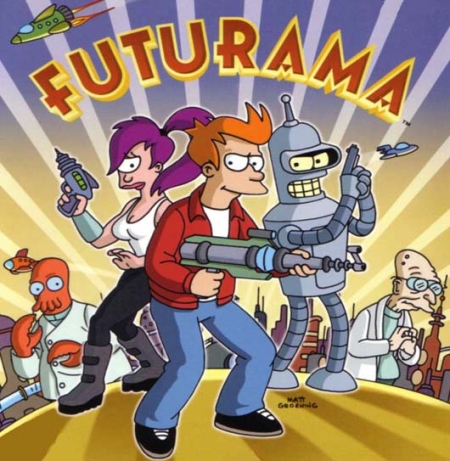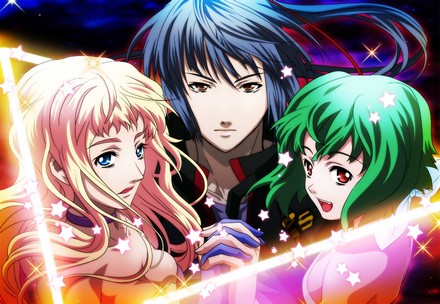
The news of Futurama's return to television was a good thing, yes? If something worthless like Family Guy can claw its way back to prime time, surely a more deserving property like Futurama could be given another chance to shine?
The revival has hit a rather sour development with the release of a casting call sheet. When I saw the news on io9 I was prepared to discount it. Delving deeper and seeing that call sheet, however, is pretty damning. I'm expecting this to explode all over certain quadrants of the internet, and for good reason: Billy West, Katey Sagal, John DiMaggio, Phil LaMarr and Maurice LaMarche are the crew of Planet Express and the people of the universe at large. They are an inextricable part of the show.
This is not like Daniel Craig succeeding Pierce Brosnan as James Bond. This is like someone killing one of your loved ones and replacing them with an android: it looks exactly like your dear old Grandmama, but it lacks her distinct personality and sounds ever so slightly off; an impersonator; an insult to the memory of someone important to you. Did no one at Fox see Changeling?
I don't see how Fox thinks they can get away with this. Part of the reason Futurama is coming back, perhaps even the entire reason, is that it has a following; people like Futurama. It has a strong and storied cast that endeared itself to audiences over 72 episodes and four movies (that I did not see) and it was genuinely funny a lot of the time.*
People who like Futurama like the cast, and anyone else is nothing more than a pale imitation. I understand replacing a voice actor for reasons of necessity:
- Death (see: legacy characters like Mickey Mouse);
- Retirement (see: Christine Cavanaugh);
- They turn out to be a serial killer who has used their position to abduct fans at conventions and then murder them.
I can't see a legitimate reason for replacing an entire, more than amply talented, ensemble (not to mention Tress MacNeille and Lauren Tom!).
"Money†is not a legitimate reason, because I can imagine that people – myself included … would not be keen to watch a Futurama that has been senselessly neutered, and therefore a large amount of the anticipated revenue stream will have died.
What is the point of watching a science fiction cartoon composed of strangers whom no one would bother ever allowing into their hearts? This is a question I ax in all sincerity: I mean, seriously, what the hell? This is arse-backwards creative philosophy. Who cares if these actors don't write or animate the material? They are still their characters, and their job is more than simply standing in front of a microphone and speaking their lines. If your cartoon is good, then your actors are going to care about the characters they represent and that care is going to translate itself to the finished product.
The call sheet is particularly insulting:
"Descriptions of these established characters follow, along with links to clips of previous episodes for reference.â€
(Emphasis mine)
Who established these characters? The fact that they're providing clips of previous episodes for reference confirms that they're not seeking a new direction: they're searching for cut-price impersonators. It's my impression that voice actors have a certain professional pride: who could honestly trample over the work of people who are plainly still capable of performing the work they've become known for?
Entirely apart from not understanding the situation, understanding why people get emotionally attached to a property, it seems that Fox don't even understand that some people have sensitive ears and will not simply deafly accept a change.
People obsess over voice actors; they follow their work across the years. I do it in both cartoons and anime, as another one of my hobbies: when I saw a trailer for Secret of Monkey Island featuring LeChuck's first mate, I said aloud "Hey, it's Rob Paulsen!â€- and it frustrates me to no end that I can't find a cast list for the game to confirm my suspicions. This would not go unnoticed by weird hobbyists like me, and even less fanatic types would be bound to notice a replacement of the entire cast of a cartoon with a large following.
It's particularly amazing that this would happen on a Matt Groening property. Does no one recall the multiple times that they have attempted to kill cast members of The Simpsons? Even The Simpsons remembered it, in largely unremarkable episode Homer to the Max:
Homer: Networks like animation ’cause they don’t have to pay the actors squat!
Ned:Â Â Â Plus, they can replace them, and no one can tell the diddly-ifference!
They then summarily jerked around Maggie Roswell, who ended up paying for the privilege of appearing on the show (her pay cheque wouldn't cover the cost of travel to recording). Marcia Mitzman-Gaven, her replacement, was probably a good voice actress in her own right, but as Maude Flanders and Helen Lovejoy she plainly sucked. They got around this problem by largely shutting Helen up and killing Maude in Alone Again, Natura-Diddly. Roswell is back now, but Maude is still dead.
Since then there has been a variety of industrial actions and talk of strikes, but the voice actors have continued to win out. I've heard The Simpsons is improving again (I haven't particularly cared to find out), but for the longest time there the established cast was all it had going for it.
Futurama is plainly not the juggernaut that The Simpsons has proven to be, but there are clear ethical, professional and fanbase considerations that apply. I'd like to think that the Futurama fan base is strong enough to convince Fox that this is an awful decision and they'd better turn this ship around instead of charting unexplored and counter-productive territory.
*This is entirely not the time to confess that a while back I went through a listing of all of the episodes and only really appreciated about half of them, the third and fourth seasons largely, but not wholly, falling flat for me.






